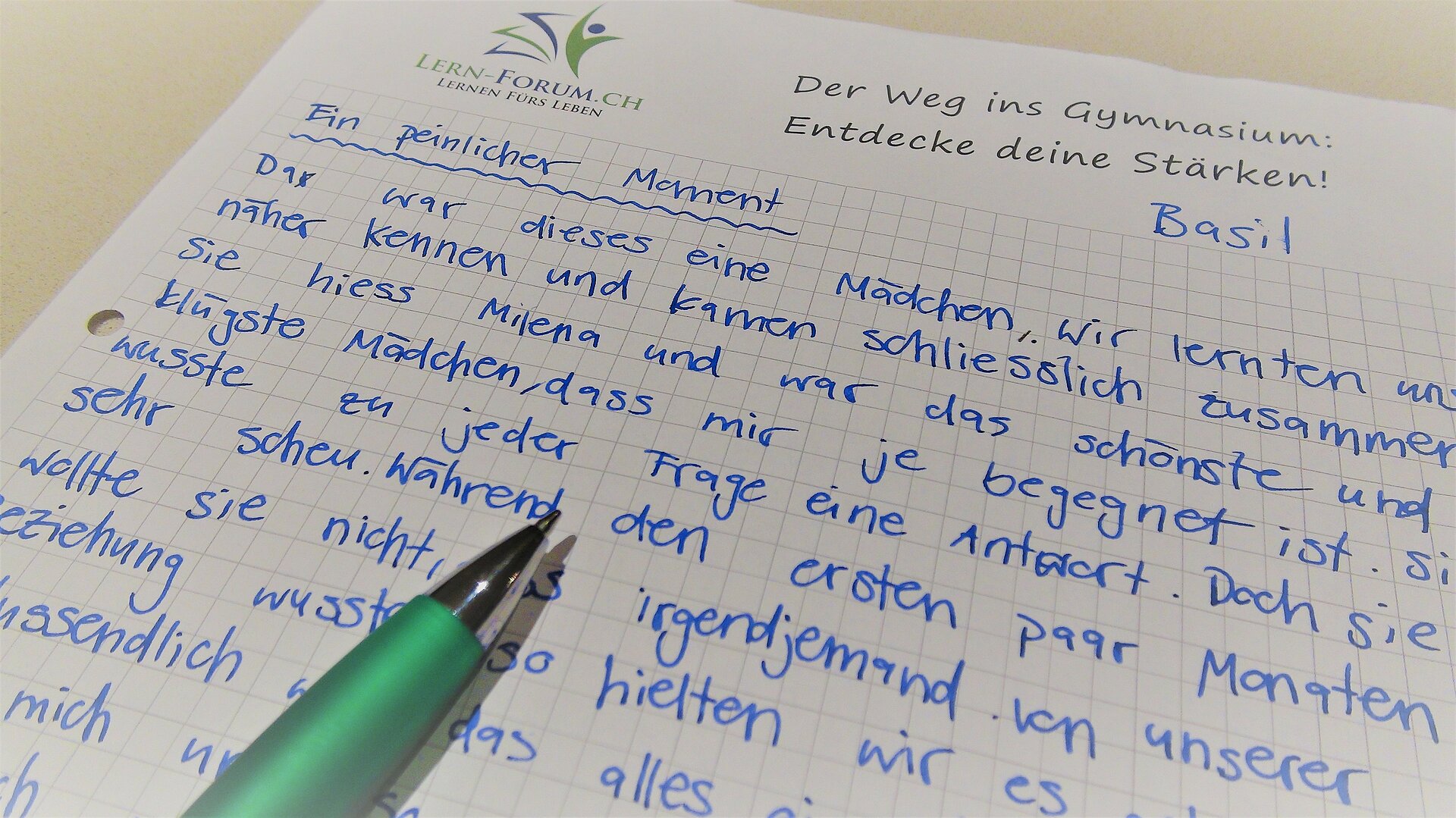
How do I write a good essay?
You can learn how to write a good essay properly. However, you have to follow certain essay rules when writing an essay and avoid certain no-gos at all costs.
In the following essay writing tips, you can find out which essay rules there are and which no-gos to avoid. You can also find a step-by-step guide to essay writing and the requirements for primary school pupils and the requirements for secondary school pupils.
Start your essay writing course now!
Essay rules
- Make sure your essay is legible, neatly written, and divided into three paragraphs (introduction, body, conclusion).
- Read through your essay several times after writing it to curb spelling and grammatical errors.
- Stick to the topic exactly when writing. Straying from the topic will result in an unsatisfactory grade.
- Formulate your narrative with easy-to-understand sentences. A reader who does not know your thoughts should be able to follow the story effortlessly. In each sentence there is a new statement that leads the reader further.
No-gos in essay writing
- Youth language such as mega, cool, super, bro, awesome. Use quality vocabulary of standard language.
- Unrealistic and implausible actions. Basically, you are expected to describe an experience that you could have had yourself. Therefore, refrain from fantasy elements, such as talking to animals, as long as the task does not explicitly ask for a fantasy story.
- Colloquial abbreviations and expressions. Examples: How's it going / Let's go! / I heard it once, too. → The essay is to be written in standard language throughout.
- At the end of the essay write "End".
- Drawing on the page or drawing hearts as i-dots. This indicates childlike behavior and suggests poor maturity for gymnasium.
Writing an essay step by step
The best way to write an essay is step by step.
Step 1: Read the assignment carefully
The assignment, the instructions and the given text must be read through calmly and with concentration in order to understand exactly what the essay should be about, what type of essay you should write, how you should write the essay, what you should possibly take from the given text, whether you should formulate the title and what else you should consider and implement.
Step 2: Create a to-do list
It is best to make a to-do list in which you list the individual points of the task to be completed and check at the end whether you have completed all the points on the to-do list and cross out the completed point when checking.
Step 3: Take notes
Think about what you want to write and make notes in bullet points. If you have received additional material for writing the essay, read through this material carefully, preferably several times, and mark important passages in this material.
Step 4: Outline the essay
Create an outline of the essay - with an introduction, main body and conclusion as a rough outline. But also divide the main body into different sections so that you know the order in which you will write down your thoughts and incorporate your previously made notes and other things that occur to you into this outline as bullet points.
Step 5: Writing the essay
Now you can start writing the essay using the outline you have created, including the notes you have incorporated, whereby you should stick to the outline as if it were a red thread.
Step 6: Proofread the text
When you have finished writing the essay, you should read it through several times if possible to find any errors that you should correct straight away. Look for spelling mistakes, punctuation errors, grammatical errors and stylistic errors (such as two consecutive sentences beginning with the same word).
You should practise writing the essay and can have the essay corrected.
- Essays for primary students
- Essays for secondary students
Writing German essays (primary students)
Primary students in year 5/6
Requirements:
- It should not be a simple list of occurrences: First we took lift up the mountain. There we bought ice cream. Then we walked back down the steep path. Afterwards we were all tired.
- Students are expected to think independently for themselves and make judgements about their immediate surroundings. They should be able to correctly interpret everyday situations and react appropriately to the actions of the people around them. They should also put their feelings on paper.
- Students should be able to express different emotions: anger, joy, envy, desire, fear, pride, hate, etc.
Be descriptive!
Don't write: On Saturday we left for our holiday.
Write: We had to be at the airport early on Saturday in order to catch our flight to Tunisia.
(This makes the text longer and also gives us more information about the student's holiday.)
You have eyes – Write what you see and what goes through your head!
You have ears – Write what you thought when you heard it.
You have a mouth – Write how you reacted to something that was said.
You have a mind – Tell us your thoughts.
You have a heart – Describe how you feel. Are you proud, disappointed, annoyed, etc.
This is what makes an essay seem alive and interesting. Tell us about yourself and your life. Share your thoughts with us.
- Some teachers tell students to use as many adjectives as possible. Unfortunately, this usually makes the essay boring, because students tend to add unfitting adjectives before every second noun.
Writing German essays (secondary school students)
Secondary stage I
Requirements:
- An essay must be divided into three paragraphs in terms of content and appearance. The introduction has the function of informing the reader factually and informatively about the core topic. The main part contains the narrative or argumentation and the final part is expected to contain a conclusion, reflection or personal opinion on the thesis.
- An essay is a formal text type. Colloquial and casual phrases and terms are not desired in the German essay. Rather, students should present their vocabulary at the entrance examination from its best side and try to use high-quality and demanding formulations.
- With a Discussion If the thesis is examined from the point of view of opponents and proponents. A balanced number of arguments should be presented convincingly. The 3-B rule can be used: Assertion, Reason, Proof. No argument should simply be thrown into the room without appropriate explanations.
- With a Narration a realistic event from the author's personal environment is usually expected. No one can verify whether a situation was personally experienced. However, it should be conveyed to the reader in a credible way that this event took place. Therefore, surreal or implausible actions should be avoided. Also the essay ending "Then I woke up and it was all just a dream" is rather undesirable.
- While discussions are formulated completely factually and neutrally, it makes a narrative more authentic and exciting if the emotional level is included. Through the Writing with all senses (Visuals, smells, sounds, sensations, feelings and thoughts), the reader succeeds in immersing himself in the narrated world and experiencing it to some extent. This is how a text is perceived as interesting.
Frequently Asked Questions about Essay Writing (FAQs)
Below, we provide answers to frequently asked questions (FAQs) about essay writing.
-
What types of essays can be expected in the central entrance examination?
The types of essays (essay formats) – also known as text types – that appear in the central entrance examination (ZAP) depend on the type of school for which the entrance examination is being taken.
The following essay types may appear in the long-term grammar school examination (ZAP 1):
- Narrative
- Report
- Description
- Letter
The following essay types may appear in the short-term Gymnasium and HMS exam (ZAP 2), the BMS and FMS exam (ZAP 3), and the IMS exam:
- Narrative
- Report
- Description
- Argumentation/ statement
-
Is there a special essay theory for the Gymnasium exam and the other central entrance exams?
No, there is no special essay theory that applies specifically to the Gymnasium exam and the other central entrance examinations (ZAP). The widely used systematic guidelines for essay theory also apply to the ZAP, including the categorisation of essay types and the rules for writing an essay of the respective type.
-
Are there different essay writing courses to learn how to write essays?
Yes, the Lern-Forum offers different essay writing courses to learn how to write essays.
On the one hand, the courses differ depending on whether they are held during the holidays (holiday courses) or during the school term (Saturday courses).
On the other hand, the essay writing courses differ depending on whether they are aimed at students in the 5th and 6th primary classes or in the 1st to 3rd secondary classes.
Have I mastered essay writing?ss
At the entrance exam, the grade in the essay plays an important role. It reveals a lot about the maturity of the student.
Test now: Essay correction online!



